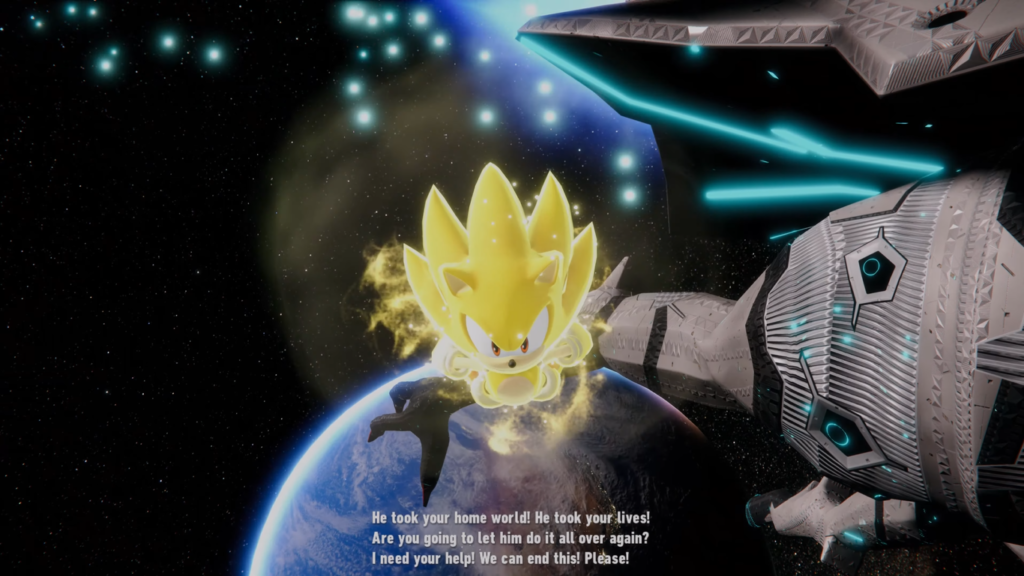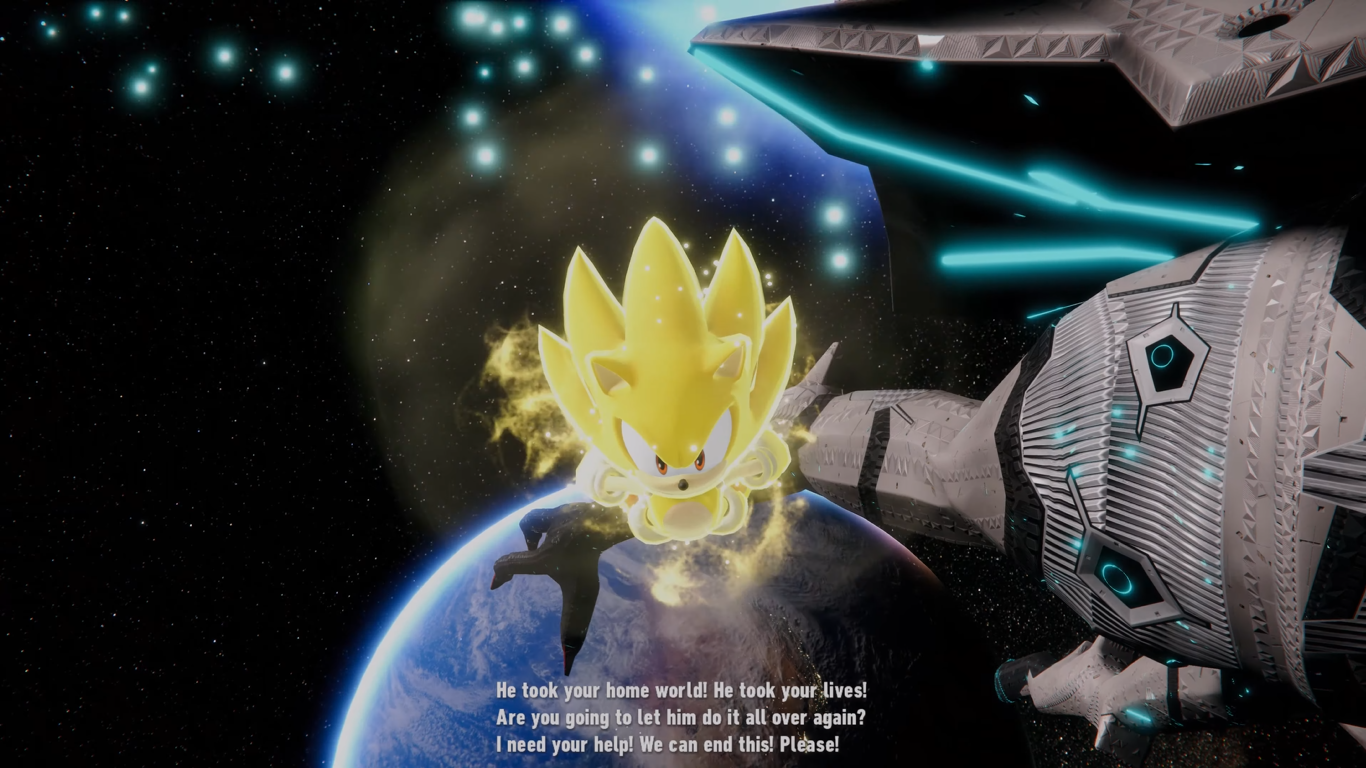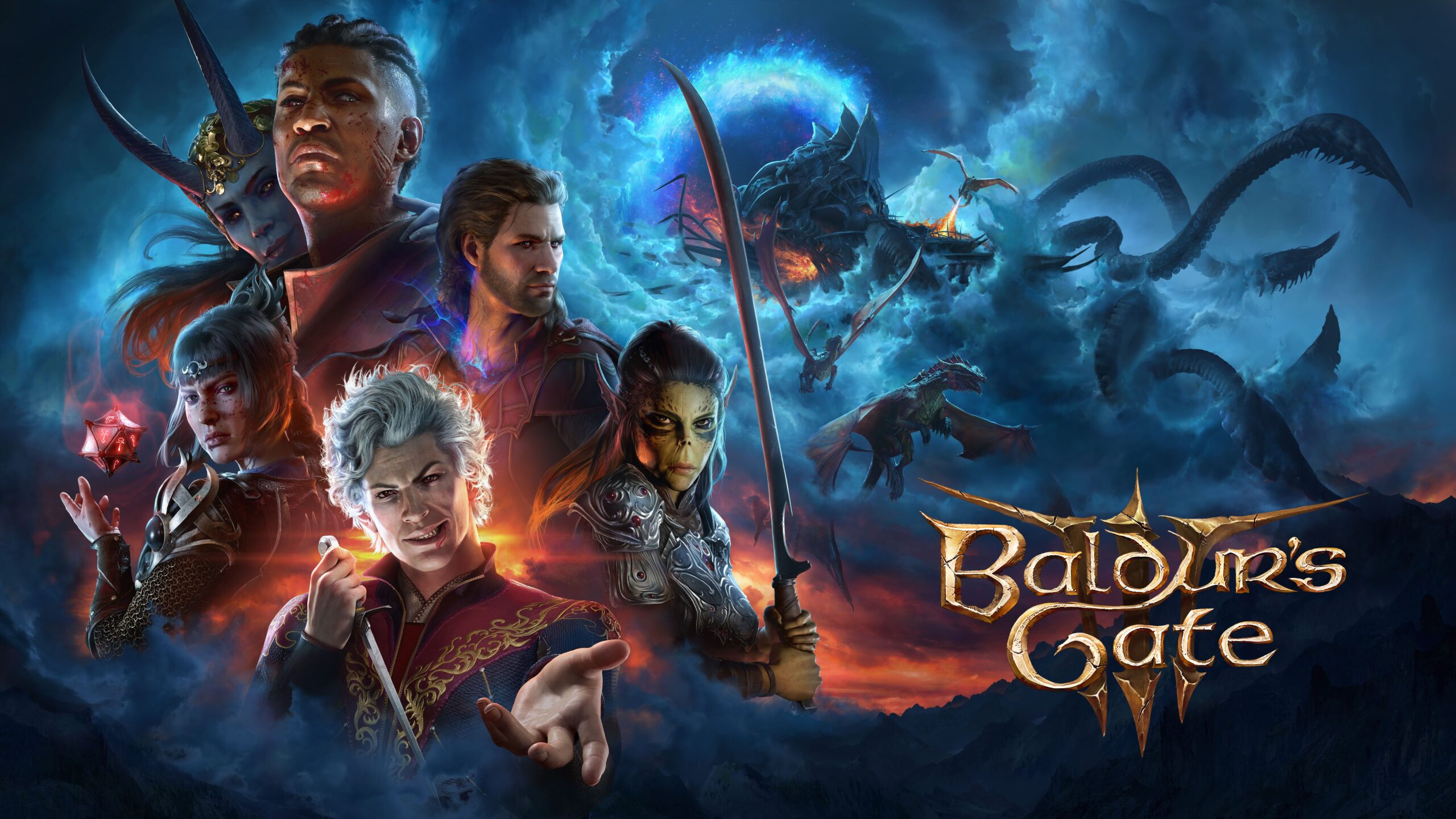
Image Source: Sega
Sonic Frontiers: Battle Cry
Dear Jay,
I can’t agree enough about just how special Frontiers is, especially in the context of the series. I know it’s old hat to mention 2006’s Sonic the Hedgehog in any writeup involving Sonic, but I think it’s important to understand 06 as the last time Sonic really dared to dream: to be big and to pursue things like worldbuilding and an earnest tone with genuine stakes; it was the last game to really attempt a story or have any ambition at all. Sonic (2006) is remembered as one of the biggest profile misfires in games history, and as such it’s been used as a cudgel to beat the ever-loving shit out of this series – its developers, and its fans, being held up as irrefutable proof that Sonic should never dare to respect itself or take itself seriously again. And in that time, we’ve seen the series unfortunately capitulate to, frankly, bad-faith criticisms that have forced Sonic into a narrow lane of grating self-awareness and conservatism, with all its original nuance and verve boiled away to a skeletal bare-minimum.
The ridiculous mantra you mentioned of Sonic’s “rough transition” into 3D has never been true as Sonic Adventure still stands as the best control Sonic’s ever had in 3D. But this has literally railroaded post-2006 Sonic games into what essentially amounts to race tracks that, rather than affording players the momentum-driven creativity, exploration, or expression that defined the series, instead merely test your reflexes; the intro to the terrible 4Kids dub of Sonic X somehow became the raison d’être of the franchise at large: gotta go fast!

The contempt for Sonic’s “shitty friends” has hurt the length and, I would argue, the value of Sonic games following 06; in addition to broadening Sonic’s world and lore, many of Sonic’s friends were meant to serve specific utility in adding mechanical variety and value to Sonic games, offering alternative modes of play. They were also an inclusive way of trying to offer players who might not yet gel with the faster-paced platforming of Sonic’s gameplay other ways to ease into and enjoy Sonic games. Since they’ve been taken off the table, we’ve seen strained compromises like Sonic Unleashed’s werehog or giving Sonic a literal sword try to make up for the streamlined Sonic “boost” gameplay. Games in the series have since become shorter, shallower experiences as a result.
And then there’s the universally agreed-upon understanding that Sonic has no business taking itself seriously. It’s a blue cartoon hedgehog, after all! Why should Sonic games try to be anything other than silly Saturday morning cartoons? It’s a truly joyless position that doesn’t care to remember or appreciate that Sonic’s always had a strong emphasis on narrative and lore. This is a stance that fails to recognize Sonic’s origin as a distinctly Japanese creation, directly inspired by works such as Dragon Ball and Studio Ghibli. I think the contempt for “serious” Sonic games stems from a cultural illiteracy that has little to no understanding of shonen storytelling: its edge, its flamboyance, its valorization of, dare I say it: the power of friendship. Detractors like to diagnose Sonic Adventure as the beginning of the end of Sonic games, condemning it as a hard swerve from Mickey Mouse to Dragon Ball Z when, in truth, the leap from Sonic 3 to Sonic Adventure was closer to the natural progression from Dragon Ball to Dragon Ball Z. Please, show me when Mickey Mouse ever turned Super Saiyan! Anyway, this misunderstanding took root and went so far as to dictate the direction of the series following Sonic (2006), where Sonic games avoid criticisms of story by just…not putting them in the games anymore. Writers with no familiarity or enthusiasm for the series were brought on to produce stories and dialogue as inoffensive as possible, and the primary demographic shifted away from all-ages to exclusively very young children who, honestly, deserved better.
All this is to put into perspective why Sonic Frontiers is such a welcome surprise. As a lapsed Sonic fan for the reasons stated above, it’s hard not to see something of a conciliatory effort in the way Frontiers presents itself. As you say, it is quite fearless in just how earnest it is. And in this way, I must confess that I see in it a radical spark of the fire that once fueled this series–the same energy that endeared me so much in the first place.
One of the most intriguing ways Frontiers excels is in its understanding of the thematic identity of the series. Where the vast majority of our cultural media is often about the defense or establishment of our lived status quo: of defending “virtuous” Order from the forces of “malevolent” Chaos, Sonic had always defined itself as distinct and opposed through its championing of Chaos, which it sees as a fundamentally positive force. In many ways, Sonic is Chaos personified: powerful yet gentle, as manic as he is easy-going. It is Sonic who is the ultimate lifeform: prophesied by the ancients to defend the world against mechanized devastation–an exemplar of life itself, of living life to the fullest, of love for life.

It’s what makes the final boss so compelling to me (even if it isn’t particularly fun to fight). Frontiers‘s final boss is simply named “The End” and, unlike any previous final boss in the series, it has no real form or wicked character design: it is, simply, a barren celestial mass that describes itself as the void. It’s the very idea of Order taken to its logical conclusion: a cold, stagnant, dead nothing. It is the inverse of Sonic: a literal flame in the dark, burning fiercely against all odds.
All throughout the game, we come to know the evil and the horror of The End as we uncover the last vestiges and the history of the Ancients who fought tirelessly to defend themselves until their bitter end. The adorable koko that litter their empty homes and temples across the Starfall Islands take on a tragic character as we discover their true nature as ghosts: good luck charms the Ancients gifted to one another in life, now animated by their fears and regrets. Sonic is able to lay them to rest throughout the game before ultimately avenging them in the final battle with a beautiful rallying cry rung across the ages.
It’s Sonic’s empathy throughout Frontiers that will continue to stay with me. His growing indignation at the destruction of the Ancients, his enthusiasm for the beauty of the Starfall Islands, and the way he interacts with not only his friends but his antagonists as well. Sonic is a character driven by freedom, peace, and nature. He’d rather take a nap in the shade of a tree or admire the splendor of a waterfall than fight. Violence is always the last resort. As the Wyvern boss theme “Break Through It All” goes:
“No more compromise
This is do or die
I’ll warn you one last time
You’ll wake the beast inside”
These lyrics have really stuck with me as they’re a perfect encapsulation of Sonic’s edge. And not the cheap, annoying, mean-spirited edge we’ve come to associate with the term. The threat of violence, the promise of wrath, becomes all the more potent coming from a character as carefree and fun-loving as Sonic. As nature’s emissary and protector, he will always fight when the need arises. It’s that conviction of character that I find so inspiring and endearing; Sonic is always running towards the Good Future, no matter the cost to himself. It’s in these ways that Frontiers is a triumph.
I think there’s a lot to learn from Sonic Frontiers. If you ask me, forced irony as a defense against criticism is what’s truly cringe. If we want to tell stories that resonate with people the way Frontiers has resonated with you and me, we have to be authentic to ourselves. If for no one else, then for Sonic.
If you like what we do here at Uppercut, consider supporting us on Patreon. Supporters at the $5+ tiers get access to written content early.






1 thought on “Sonic Frontiers: Battle Cry”